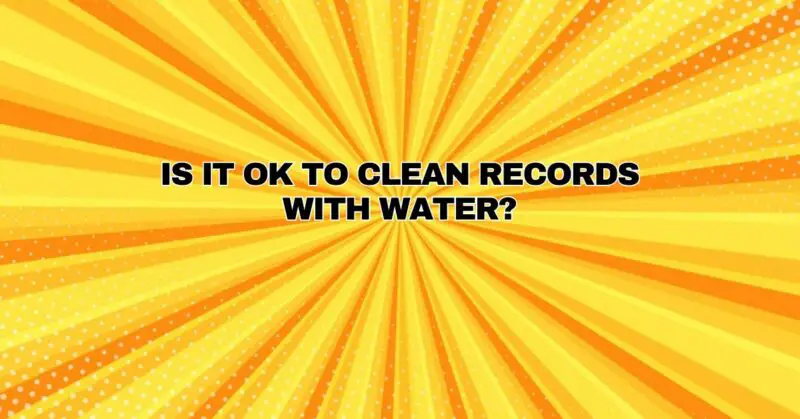Vinyl records, celebrated for their warm analog sound and tactile appeal, require meticulous care to maintain their quality and longevity. Regular cleaning is an integral part of vinyl record maintenance, as dust, dirt, and contaminants can accumulate on the grooves, leading to pops, crackles, and diminished sound quality. While many vinyl enthusiasts invest in specialized cleaning solutions and tools, a recurring question is whether it is safe to clean records with water. In this comprehensive article, we will explore the dos and don’ts of cleaning vinyl records with water and provide insights into best practices for preserving your cherished vinyl collection.
Understanding the Significance of Cleaning Vinyl Records
Before delving into the use of water, it’s crucial to recognize the importance of cleaning vinyl records. Records, by their nature, are prone to accumulating dust, static electricity, and oils from handling. These contaminants can affect the playback quality and, over time, potentially damage the grooves. Proper cleaning not only enhances sound fidelity but also prolongs the lifespan of your records.
Cleaning Vinyl Records with Water: The Dos and Don’ts
Dos:
- Use Distilled or Deionized Water: If you decide to clean records with water, opt for distilled or deionized water, which is free of minerals and impurities. Tap water contains minerals and additives that can leave residue on the record.
- Mild Detergent: In some cases, a gentle, alcohol-free dishwashing detergent can be added to the water to help break down surface contaminants. However, use detergent sparingly and ensure it is thoroughly rinsed.
- Microfiber Cloth or Soft Brush: Employ a clean, lint-free microfiber cloth or a soft brush designed for vinyl record cleaning to apply and remove the water solution. Gently clean the record surface in the direction of the grooves.
- Air Drying: After cleaning, allow the record to air dry vertically in a clean, dust-free environment. Avoid using heat sources or direct sunlight for drying, as they can warp the record.
Don’ts:
- Avoid Submersion: Never submerge the entire record in water. Water can penetrate the label, causing it to warp, and damage the record’s core.
- Minimize Contact with the Label: Be cautious when applying water near the label area to prevent label damage, smudging, or peeling.
- No Harsh Scrubbing: Do not apply excessive pressure or scrub the record vigorously. Vinyl is a relatively soft material and can be damaged easily.
- Use Only Distilled Water: Do not use tap water, as it contains minerals and impurities that can leave behind residue on the record.
Alternative Cleaning Methods
While water can be used cautiously for cleaning records, there are alternative methods and dedicated cleaning solutions designed explicitly for vinyl records:
- Vinyl Record Cleaning Solutions: Commercially available record cleaning fluids are specially formulated for vinyl records, ensuring effective and safe cleaning.
- Record Cleaning Machines: These devices use a combination of cleaning solutions and brushes to deep clean vinyl records thoroughly.
- Vinyl Record Cleaning Brushes: Anti-static brushes and carbon-fiber brushes are designed for dry cleaning, effectively removing surface dust and debris.
Conclusion
Cleaning vinyl records with water can be done if approached with care and the right precautions. The choice between using water and dedicated vinyl cleaning solutions depends on your comfort level and the specific needs of your records. Regardless of the method you choose, regular cleaning and maintenance are crucial for preserving the quality and longevity of your vinyl collection. By following proper cleaning practices and exercising caution when using water, you can continue to enjoy the rich, analog sound that vinyl records offer without compromising their integrity.

